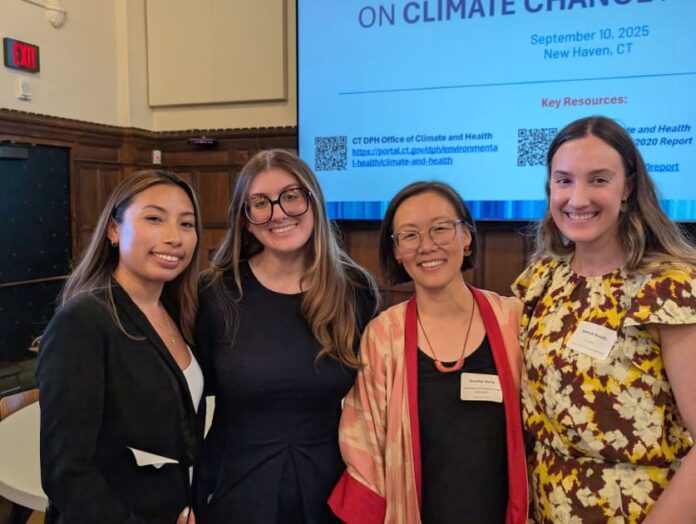"Building Resilience: Connecticut’s Climate and Health Symposium Unites Experts for Action Against Climate Risks"
Connecticut Symposium on Climate and Health: Addressing Climate Risks and Community Resilience
Hartford, CT — On September 10, 2025, the Connecticut Symposium on Climate and Health convened researchers, community leaders, and public officials to discuss the pressing climate risks facing the state and their implications for public health. Co-hosted by the Yale Center on Climate Change and Health (YCCCH) and the Connecticut Department of Public Health (DPH), the event emphasized the need for localized evidence and collaborative action in an increasingly challenging national policy landscape.
Key Insights from the Symposium
Dr. Kai Chen, Faculty Director of YCCCH, and Hannah Beath, DPH Director of Climate and Health, opened the symposium by highlighting the critical role of state and local partnerships in addressing climate-related health challenges. They underscored the urgency of building resilience among communities, particularly those disproportionately affected by climate change.
The first panel focused on the escalating climate challenges in Connecticut, featuring insights from James O’Donnell and Dr. Marc de Vos of the University of Connecticut’s Connecticut Institute for Resilience and Climate Adaptation (CIRCA). Their projections indicate a significant decrease in extreme cold events by the century’s end, juxtaposed with a dramatic increase in dangerous heat days, rising sea levels, and more frequent hazardous storm surges. These changes pose substantial risks to homes, infrastructure, and essential services such as drinking and wastewater systems.
Health Impacts of Climate Change
Dr. Chen presented compelling research demonstrating the direct health impacts of climate exposures in Connecticut. His findings include:
- Heat and Ozone Interaction: Elevated temperatures combined with ozone pollution significantly increase the risk of heart attacks and strokes, even among young, healthy adults.
- Wildfire Smoke Effects: The 2023 wildfire smoke event in the Northeast led to a notable rise in asthma-related emergency department visits. Long-term exposure to wildfire smoke is linked to thousands of premature deaths annually.
- Post-Flood Health Risks: Months following flooding events, communities experience heightened risks for cardiovascular, respiratory, digestive, and mental health issues.
Equity and Justice in Climate Solutions
A central theme of the symposium was the intersection of climate change and social equity. Dr. Eleanor Shoreman-Ouimet, an anthropologist at UConn, discussed the concept of "eco-social-structural" vulnerability, illustrating how factors such as housing quality, income, and access to emergency services disproportionately affect marginalized communities. Sharon Lewis, Director of the Connecticut Coalition for Economic and Environmental Justice, emphasized that those most impacted by climate change must be at the forefront of developing solutions.
Local Initiatives and Community Resilience
The symposium showcased successful local initiatives aimed at enhancing community resilience. Rebecca French from the Connecticut Department of Energy and Environmental Protection (CT DEEP) highlighted projects that deliver a "triple impact" of affordability, community resilience, and public health. Notable examples included:
- Air Quality Monitoring: Initiatives in Stamford led by Dipika Khushalani aim to improve public health through better air quality data.
- Brownfield Remediation: The transformation of a Bridgeport brownfield site, known as "Mount Trashmore," into a community space called "Mount Growmore," presented by Deborah Sims and Karen Soares.
- Community Engagement: The Place for CommUNITY Wellbeing in New London, led by Jennifer Muggeo and Corona Zhang, emphasizes the importance of centering community voices in health initiatives.
The Path Forward
Dr. Mark Mitchell, a member of the YCCCH Advisory Board, stressed the importance of trusted health voices in fostering support for climate action. He argued that health professionals have a responsibility to advocate for climate solutions, bridging divides and mobilizing communities.
The symposium concluded with participants identifying shared priorities for future action, including:
- Expanding resilience hubs across the state.
- Integrating funding sources to scale local projects.
- Strengthening the connection between research and policy.
- Investing in a trained climate-health workforce.
- Ensuring clear, multilingual communication.
- Centering community involvement in all initiatives.
As Jennifer Wang of YCCCH and Beath reminded attendees, the most vital infrastructure in Connecticut is its relationships. The discussions and collaborations sparked during the symposium will guide efforts to build a healthier, more resilient state in the face of ongoing climate challenges.
The Connecticut Symposium on Climate and Health serves as a pivotal platform for fostering dialogue and action, ensuring that the voices of those most affected by climate change are heard and prioritized in the quest for sustainable solutions.
